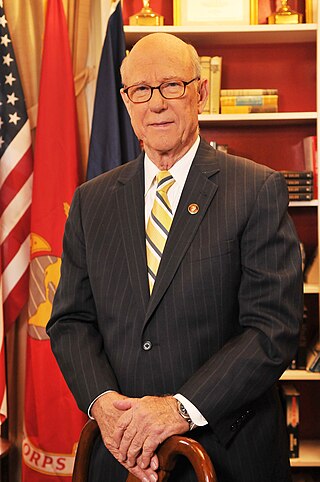
Genetically modified foods, also known as genetically engineered foods, or bioengineered foods are foods produced from organisms that have had changes introduced into their DNA using various methods of genetic engineering. Genetic engineering techniques allow for the introduction of new traits as well as greater control over traits when compared to previous methods, such as selective breeding and mutation breeding.

Charles Patrick Roberts is a retired American politician and journalist who served as a United States senator from Kansas from 1997 to 2021. A member of the Republican Party, Roberts served 8 terms in the U.S. House of Representatives, from 1981 to 1997, before his election to the Senate.

The United States Federal Food, Drug, and Cosmetic Act is a set of laws passed by the United States Congress in 1938 giving authority to the U.S. Food and Drug Administration (FDA) to oversee the safety of food, drugs, medical devices, and cosmetics. The FDA's principal representative with members of congress during its drafting was Charles W. Crawford. A principal author of this law was Royal S. Copeland, a three-term U.S. senator from New York. In 1968, the Electronic Product Radiation Control provisions were added to the FD&C. Also in that year the FDA formed the Drug Efficacy Study Implementation (DESI) to incorporate into FD&C regulations the recommendations from a National Academy of Sciences investigation of effectiveness of previously marketed drugs. The act has been amended many times, most recently to add requirements about bioterrorism preparations.

The Public Health Service Act is a United States federal law enacted in 1944. The full act is codified in Title 42 of the United States Code, Chapter 6A . This Act provided a legislative basis for the provision of public health services in the United States.

Genetically modified food controversies are disputes over the use of foods and other goods derived from genetically modified crops instead of conventional crops, and other uses of genetic engineering in food production. The disputes involve consumers, farmers, biotechnology companies, governmental regulators, non-governmental organizations, and scientists. The key areas of controversy related to genetically modified food are whether such food should be labeled, the role of government regulators, the objectivity of scientific research and publication, the effect of genetically modified crops on health and the environment, the effect on pesticide resistance, the impact of such crops for farmers, and the role of the crops in feeding the world population. In addition, products derived from GMO organisms play a role in the production of ethanol fuels and pharmaceuticals.

The Prescription Drug User Fee Act (PDUFA) was a law passed by the United States Congress in 1992 which allowed the Food and Drug Administration (FDA) to collect fees from drug manufacturers to fund the new drug approval process. The Act provided that the FDA was entitled to collect a substantial application fee from drug manufacturers at the time a New Drug Application (NDA) or Biologics License Application (BLA) was submitted, with those funds designated for use only in Center for Drug Evaluation and Research (CDER) or Center for Biologics Evaluation and Research (CBER) drug approval activities. In order to continue collecting such fees, the FDA is required to meet certain performance benchmarks, primarily related to the speed of certain activities within the NDA review process.

President of the United States George W. Bush signed the Food and Drug Administration Amendments Act of 2007 (FDAAA) on September 27, 2007. This law reviewed, expanded, and reaffirmed several existing pieces of legislation regulating the FDA. These changes allow the FDA to perform more comprehensive reviews of potential new drugs and devices. It was sponsored by Reps. Joe Barton and Frank Pallone and passed unanimously by the Senate.
Priority review is a program of the United States Food and Drug Administration (FDA) to expedite the review process for drugs that are expected to have a particularly great impact on the treatment of a disease. The priority review voucher program is a program that grants a voucher for priority review to a drug developer as an incentive to develop treatments for disease indications with limited profitability.
The United States is the largest grower of commercial crops that have been genetically engineered in the world, but not without domestic and international opposition.
Genetically modified canola is a genetically modified crop. The first strain, Roundup Ready canola, was developed by Monsanto for tolerance to glyphosate, the active ingredient in the commonly used herbicide Roundup.

The Food Safety Modernization Act (FSMA) was signed into law by President Barack Obama on January 4, 2011. The FSMA has given the Food and Drug Administration (FDA) new authority to regulate the way foods are grown, harvested and processed. The law grants the FDA a number of new powers, including mandatory recall authority, which the agency has sought for many years. The FSMA requires the FDA to undertake more than a dozen rulemakings and issue at least 10 guidance documents, as well as a host of reports, plans, strategies, standards, notices, and other tasks.

The regulation of genetic engineering varies widely by country. Countries such as the United States, Canada, Lebanon and Egypt use substantial equivalence as the starting point when assessing safety, while many countries such as those in the European Union, Brazil and China authorize GMO cultivation on a case-by-case basis. Many countries allow the import of GM food with authorization, but either do not allow its cultivation or have provisions for cultivation, but no GM products are yet produced. Most countries that do not allow for GMO cultivation do permit research. Most (85%) of the world's GMO crops are grown in the Americas. One of the key issues concerning regulators is whether GM products should be labeled. Labeling of GMO products in the marketplace is required in 64 countries. Labeling can be mandatory up to a threshold GM content level or voluntary. A study investigating voluntary labeling in South Africa found that 31% of products labeled as GMO-free had a GM content above 1.0%. In Canada and the USA labeling of GM food is voluntary, while in Europe all food or feed which contains greater than 0.9% of approved GMOs must be labelled.
The Farmer Assurance Provision refers to Section 735 of US H.R. 933, a bill that was passed by the Senate on March 20, 2013, and then signed into law as part of the Consolidated and Further Continuing Appropriations Act, 2013 by President Barack Obama on March 26, 2013. The provisions of this law remained in effect for six months, until the end of the fiscal year on September 30, 2013. The Farmer Assurance Provision was discontinued in Sec. 101 of the Continuing Appropriations Act, 2014. The bill is commonly referred to as the "Monsanto Protection Act" by its critics.

The March Against Monsanto was an international grassroots movement and protest against Monsanto, a producer of genetically modified organisms (GMOs) and Roundup, a glyphosate-based herbicide. The movement was founded by Tami Canal in response to the failure of California Proposition 37, a ballot initiative which would have required labeling food products made from GMOs. Advocates support mandatory labeling laws for food made from GMOs.

The Animal Drug and Animal Generic Drug User Fee Reauthorization Act of 2013 is a bill that was introduced into the United States Senate during the 113th United States Congress. The bill would authorize the collection of fees by the Food and Drug Administration for use to fund activities related to the approval of drugs for animals. The bill would amend the Federal Food, Drug, and Cosmetic Act.
The Safe and Accurate Food Labeling Act was an American bill that died in 2016 but not before it influenced Public Law 114-214 in Committee. The purpose of both bills was to amend the Agricultural Marketing Act of 1946. The competitor legislation was signed into law by President Obama on 29 July 2016.

The 21st Century Cures Act is a United States law enacted by the 114th United States Congress in December 2016 and then signed into law on December 13, 2016. It authorized $6.3 billion in funding, mostly for the National Institutes of Health. The act was supported especially by large pharmaceutical manufacturers and was opposed especially by some consumer organizations.

Janet Woodcock is an American physician serving as Principal Deputy Commissioner of Food and Drugs, having previously served as Acting Commissioner of the U.S. Food and Drug Administration (FDA). She joined the FDA in 1986, and has held a number of senior leadership positions there, including terms as the Director of Center for Drug Evaluation and Research (CDER) from 1994 to 2004 and 2007 to 2021.

Rostin Behnam (born February 16, 1978) is an American lawyer and government official who currently serves as the 15th chairman of the Commodity Futures Trading Commission (CFTC). Prior to leading the CFTC, he served as one of five-member CFTC commissioners, having been nominated on July 13, 2017 by President Donald Trump to fulfill a term expiring June 19, 2021. Behnam was unanimously confirmed by the Senate on August 3, 2017, and sworn in as commissioner on September 6, 2017. On January 21, 2021, the commission members unanimously elected Behnam to be acting chairman following President Joe Biden' s inauguration and the resignation of Heath Tarbert, who served as chairman since July 15, 2019. Behnam was re-nominated by President Biden as a commissioner, and simultaneously nominated to chair the agency for a new 5-year term through June 19, 2026. Behnam was unanimously confirmed by the Senate on December 15, 2021, and sworn in as CFTC's chairman and chief administrative officer on January 4, 2022.
Genetic engineering in North America is any genetic engineering activities in North America






